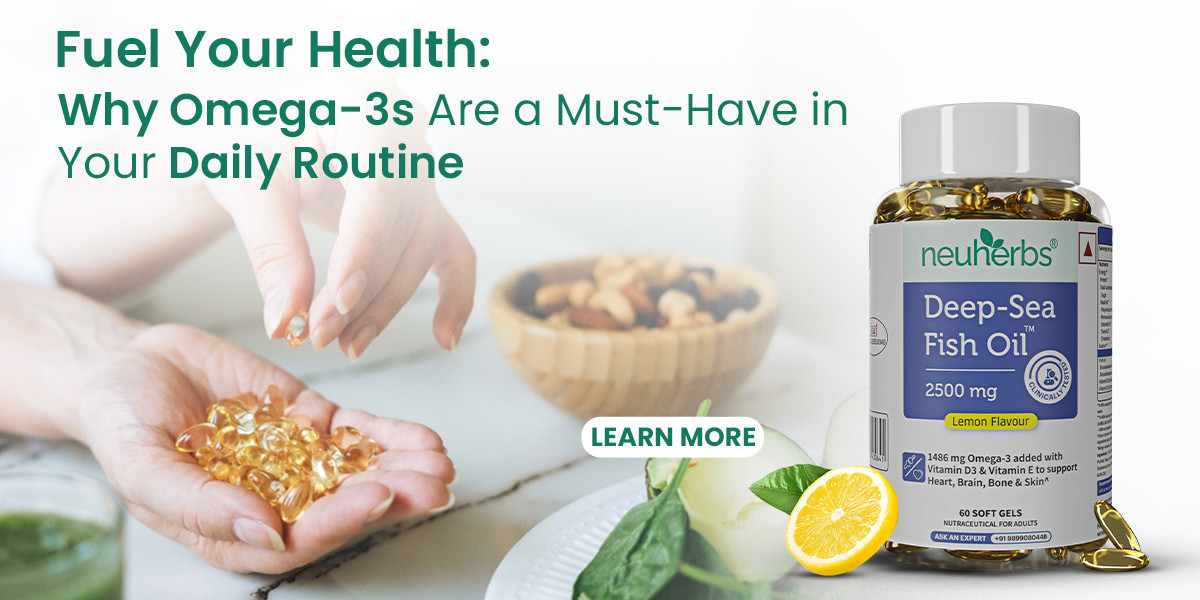Research shows that many Indians consume far too little omega-3. For example, a study of school-going children in Hyderabad found that the average DHA and EPA intake was around 35.6 mg and 4.1 mg per day, respectively. These numbers are well below international recommendations, which often suggest 250-500 mg per day of EPA and DHA for adults. Another study in South Indian pregnant women showed that 98% were omega-3 deficient, regardless of their age, diet, and sociodemographic background. This gap is linked to a higher risk of heart disease, diabetes, mood disorders, and chronic inflammation. Omega-3 fish-oil capsules provide one of the more reliable ways to close this deficiency when diet alone isn’t enough.
This blog explores why omega-3 is essential, its role in overall health, signs of deficiency, and simple ways you can add it to your daily routine.
What is Omega-3? What Makes it Essential?
Omega-3 fatty acids are polyunsaturated fats that your body cannot produce on its own. This makes them "essential" nutrients because you must get them through your food or supplements.
The word "essential" isn't used lightly in healthcare. Just as machinery needs proper maintenance, your body can't function properly without omega-3s. They are crucial for basic cellular processes that keep you alive and healthy.
There are three main types of omega-3s you should know about. ALA (alpha-linolenic acid) comes from plant sources like flaxseeds and walnuts. EPA (eicosapentaenoic acid) and DHA (docosahexaenoic acid) are found primarily in fatty fish. Your body can convert some ALA into EPA and DHA, but this conversion is limited. Omega-3s found in deep-sea fatty fish are deemed more effective than those found in regular or tank-bred fish.
These fatty acids form part of cell membranes and help cells communicate and coordinate better. They also help reduce chronic inflammation, improve brain function, and protect your cardiovascular system. Without enough omega-3s, your body may struggle to perform these functions optimally.
What Happens When You Don't Get Enough Omega-3s
Modern lifestyles have created a perfect storm for omega-3 deficiency. Our parents' diet included more fish in coastal regions and omega-3-rich seeds inland. Now, processed foods high in omega-6 oils dominate our meals, which has created an imbalance that instantly develops inflammation.
Your body gives clear signals when omega-3 levels drop. Dry, flaky skin becomes more evident as cell membranes lose their flexibility. Joint pain and morning stiffness increase because inflammation goes unchecked. Your mood may suffer, with increased irritability or difficulty concentrating. Sleep quality also often deteriorates, leaving you tired despite adequate rest.
Women face additional challenges due to omega-3 deficiency. Menstrual cramps may worsen, PMS turns severe with each cycle, and an imbalance in hormones can affect everything, from energy levels to skin health. Furthermore, pregnant women risk compromising their baby's brain and eye development.
The connection between inflammation and omega-3s is particularly concerning. Chronic low-grade inflammation, partly caused by omega-3 deficiency, can develop into heart disease, diabetes, obesity, PCOS, and even cancer. This increasing inflammatory process happens gradually, but continuously in your body, slowly damaging tissues and organs.
Air pollution, stress, and sedentary habits of urban lifestyles all increase your body's need for anti-inflammatory nutrients like omega-3s.
What are the Benefits of Omega-3?
Omega-3 fatty acids work throughout your body to maintain optimal health and prevent disease.
Cardiovascular System: Your heart benefits the most from adequate omega-3 intake. These fats help lower triglyceride levels by up to 30%, reduce blood pressure, and prevent dangerous blood clots from forming. Taking omega-3 regularly can also reduce your risk of heart attacks and strokes. Their anti-inflammatory properties protect your blood vessels from damage caused by high cholesterol.
Cognitive System: Many of you may not be aware of this, but DHA makes up nearly 40% of the fatty acids in your brain tissue. Good levels of this fatty acid improve memory formation, concentration, and learning ability. Omega-3 fatty acids also slow down age-related cognitive decline and reduce the rate of depression and anxiety.
Joints and Muscles: The anti-inflammatory properties of omega-3 help reduce morning stiffness and joint pain. This is helpful for people with arthritis. Omega-3s also help athletes and bodybuilders recover faster from intense workouts and sports.
Skin and Hair: As omega-3s strengthen cell membranes and reduce inflammation over months, your skin texture and hair health naturally change. You may notice more hydrated and younger skin and firmer, shinier hair.
What are the Best Sources of Omega-3s?
Getting omega-3s from food sources provides the most natural approach to meeting your nutritional needs.
Fatty fish, such as salmon, anchovies, herrings, mackerels, and sardines, are considered the gold standard of EPA and DHA. A 100-gram serving of salmon provides about 2.3 grams of omega-3s. However, some fish sourced from unsafe water may have high mercury contamination.
Plant-based sources offer ALA omega-3s. Flaxseeds, chia seeds, and walnuts are excellent options for vegetarians. Two tablespoons of ground flaxseeds provide about 3.2 grams of ALA.
Fortified foods like omega-3-enriched eggs, paneer, and milk can fill the gap. Some brands add fish oil or algae-derived omega-3s to their products. These options help, but they usually provide smaller amounts compared to direct fish consumption or supplementation.
Why Omega-3 Supplements are Important?
Modern food habits, laced with refined fats, junk food, and processed ingredients, make it hard for our bodies to absorb omega-3s. Fresh fish isn't available everywhere, and when it is, mercury and lead contamination, freshness concerns, and poor preparation methods create barriers.
Good quality, ethically sourced omega-3 fish oil capsules solve these problems by providing concentrated, consistent, and purified doses. Each standard capsule can deliver the RDA of EPA and DHA. In addition, the molecular distillation process removes all kinds of toxins, including cobalt, cadmium, mercury, lead, and copper, without diminishing their efficacy.
Another major plus point is convenience. Fish oil capsules are readily available in packs of 60 and 120, which is sufficient for two months, if not more. Besides, taking a supplement with your morning meal is simpler than planning and preparing fish dishes every week. This consistency helps maintain steady omega-3 levels in your blood and tissues.
omega-3 supplements address common supplement concerns. Their deep-sea fish oil capsules undergo up to 3X molecular distillation for purity and are third-party tested for heavy metals, ingredient quality, and contaminants. It is the only brand in India that offers fish oil supplements infused with natural lemon flavour. This helps remove fishy burps, which often discourage many people from taking fish oil supplements.
The leading wellness brand also adds Vitamin E to prevent rancidity and Vitamin D3 to support overall health.
Final Thoughts
Your body sends clear signals when it's lacking omega-3s, so it would be unwise to consider fish oil capsules a passing trend. The benefits go far beyond basic health.
If you're not eating fatty fish several times per week, supplements are essential. Consult an expert and opt for only high-quality products from reputable brands that prioritise purity and testing.
Begin with a standard dose and maintain consistency. Omega-3s take at least 8 – 12 weeks to build. Consider your individual needs. Pregnant women, people with inflammatory conditions, and those with limited fish consumption may need higher amounts under strict professional guidance.
If you need assistance, follow the link to talk to a certified nutritionist.
FAQs
What kind of Omega-3 supplements should I take?
Omega-3 fish oil capsules are the most effective option as they provide both EPA and DHA directly. Look for deep-sea fish oil and molecularly distilled products. Choose supplements with clear EPA and DHA content labelling and third-party certifications, such as FDA and FSSAI.
I am a vegetarian. Please suggest a veg alternative for Omega-3.
Flaxseed oil capsules are a good alternative. Along with Omega-3, it also provides the goodness of omega-9, vitamin E, and vitamin D3.
What is the right dosage for omega-3? How can I take it everyday?
For general health, 500-1000mg of combined EPA and DHA daily is recommended. To improve absorption, take your supplement with meals containing healthy fats. Start with one capsule daily and increase if needed based on your health goals and professional advice.
Please explain fish oil benefits for women?
Reduced menstrual cramps, better mood during PMS, and good hormonal balance are a few prominent fish oil benefits for women. During pregnancy, omega-3s support foetal brain development and reduce preterm birth risk. Postmenopausal women also support their overall health and wellness by taking advantage of fish oil capsules.
Where can I buy the best fish oil capsules?
You can purchase neuherbs omega-3 supplements from their official website (neuherbs.com) or trusted platforms like Amazon, Nykaa, and TATA 1mg. Always buy from authorised retailers to receive a quality product.
Can I take Omega-3 fish oil supplements and Ashwagandha together?
Yes, omega-3 fish oil capsules and Ashwagandha can be taken together safely and may provide complementary benefits. Omega-3s support heart and brain health while Ashwagandha helps manage stress and anxiety. Both supplements work through different mechanisms, making combination therapy more effective.







